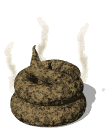Tue Feb 10, 2009 2:10 pm
I'm not a botulism expert, but I am a microbiologist. Bug is correct on all points, but he didn't mention one thing that's causing the confusion.
Botulism is an obligate anaerobe (= needs zero oxygen to live). Therefore, there are possibly botulism spores in your wort, and they will survive the boiling process during brewing, but because you are oxygenating and then fermenting the wort (thus raising the alcohol and lowering the pH), they will never become a problem in beer.
The problem comes when you do not ferment right away and can the wort. When you can wort, you are essentially creating an anaerobic (zero oxygen) environment, and so if you do not get the temperature to 250 F, the spores survive your heat treatment, and then have a nutrient rich, anaerobic environment (= perfect for them, deadly for us). Because you are not fermenting this wort right away, the bacteria are not inhibited by alcohol or pH, and so can grow and produce toxins in the wort, which you will not be able to get rid of, no matter what the downstream treatment.
The guidelines for canning are based on botulism (the bacteria are deadly and nearly undetectable by smell or visually, and so are the biggest threat to those that can foods). Acidic foods like pickles, tomato sauce, etc. are safe with boiling water bath treatment because the acidic pH will do the work that heat won't and inhibit the spores from growing. Non-acidic foods like vegetables or wort must be pressure cooked in order to be safe (must kill the spores). I'm not sure of the pH cutoff, but for safeties sake, I wouldn't can any wort (or food, for that matter) without reaching a 250 F temp during the canning process.
Corporal, BN Army Rural/BFE Division
On Tap: Janet's Brown (Sextuple Hopped!)
Secondary: none
Primary:
Bottled: Cider, Mead, Blonde, Wine
On Deck: Chocolate Oatmeal Stout and Scottish 70/-







